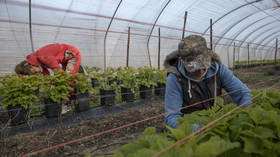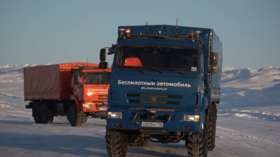Brexit and Covid-19 are keeping migrant agricultural workers away, but will the British ever dig for food, let alone victory?

The UK’s environment secretary has admitted that some 20,000 agricultural workers who’d been expected from EU countries haven’t arrived. As peak harvest time nears, he wants Brits to fill the void, but that’s wishful thinking.
The UK had expected 30,000 casual agricultural laborers to have landed in the country by now for the peak harvests in May and June. On Wednesday morning, UK environment secretary George Eustice told BBC Radio 4’s Today programme that only a third of that number had arrived, leaving the British farming industry in deep manure.
Many have been prevented from coming due to ‘lockdown’ measures aimed at preventing the spread of Covid-19. With these restrictions unlikely to ease in time, Eustice told the BBC “we will need a significant number of British people, in particular those who have been furloughed.”
“We are getting huge interest from people wanting to do this,” he added. “We need tens of thousands of people to do this work.”
Also on rt.com UK Environment Secretary Eustice blasted after suggesting furloughed workers get 2nd job picking fruitBut will the food producers get them? How ‘huge’ is that interest? Perhaps Britain’s most famous morale-pumping wartime slogan was ‘Dig for Victory,’ which implored the nation’s citizens to grow potatoes and rhubarb for the war effort seven decades ago. But it’s a very different country now.
First, there are issues of aptitude and attitude. Fewer British people have gardens, and how many know the right end of a shovel? They’re also less used to physical labor: Britain’s economy, according to government figures, is more than 80 percent service-based and you can’t eat financial advice. The British are used to other people (read: migrant labor) doing the hard graft.
Then there are logistical questions. Farms are, naturally, in the countryside, but Britain’s population has become steadily less rural over the last 50 years.
In a wealthy 21st-century nation, can we really expect people to travel two or three hours each way –unpaid– from, say, east London or central Birmingham for minimum wage?
Also on rt.com We working classes are happy to pick fruit alongside imported Romanians, but neither they, nor we, should be exploited so badlyMany of the usual casual EU migrant workers live on-site. Should someone on furlough be separating themselves from their family or even uprooting them to live in a caravan in Norfolk? Again, for minimum wage.
Then there’s the legality of Eustice’s suggestion. Furloughed workers can only take a second job if there’s no contractual clash with their main job and they can only work outside of their normal contracted working hours. Will it mean anyone with a day job would need to get used to uprooting turnips at night?
So, are there around 20,000 available British people for whom none of these barriers apply? No one can say for sure. These are strange times and people are desperate.
However, there is, perhaps, a bigger question: what happens next year when Covid-19 has (hopefully) been tamed and Brexit is in full effect?
Also on rt.com Contact-tracing app will be ‘key part’ of UK government’s Covid-19 ‘surveillance programme’ – Johnson spokesmanThis year’s expected 30,000 workers is half the estimated number that arrived in 2017 (according to the National Farmers Union) and they made up 99 percent of all casual farm labor. With the UK government expecting to introduce vertiginous skills and salary requirements for all migrants in 2021, it seems some are already preparing a future away from the UK. The current crisis might show how damaging that could be.
Think your friends would be interested? Share this story!














